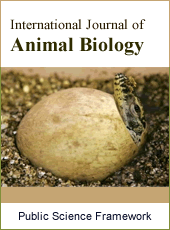International Journal of Animal Biology
Articles Information
International Journal of Animal Biology, Vol.1, No.5, Oct. 2015, Pub. Date: Aug. 26, 2015
Eclosion Rhythm of Plodia interpunctella Under Non-24 h Thermocycles
Pages: 273-280 Views: 5075 Downloads: 1337
[01]
Shigeru Kikukawa, Biological Institute, Faculty of Science, University of Toyama, Toyama, Japan.
[02]
Yuta Kakihara, Biological Institute, Faculty of Science, University of Toyama, Toyama, Japan.
[03]
Yuki Okano, Biological Institute, Faculty of Science, University of Toyama, Toyama, Japan.
[04]
Renpei Shindou, Biological Institute, Faculty of Science, University of Toyama, Toyama, Japan.
[05]
Naoyuki Sugino, Biological Institute, Faculty of Science, University of Toyama, Toyama, Japan.
[06]
Jinnai Tsunekawa, Biological Institute, Faculty of Science, University of Toyama, Toyama, Japan.
[07]
Akihiro Yasui, Biological Institute, Faculty of Science, University of Toyama, Toyama, Japan.
[08]
Kazuhito Yoneda, Biological Institute, Faculty of Science, University of Toyama, Toyama, Japan.
The present study focuses on the adult eclosion rhythm of the Indian meal moth, Plodia interpunctella Hübner (Lepidoptera: Pyralidae), under two non-24 h thermocycles of 30°C/20°C and 25.5°C/24.5°C in constant darkness (DD). The thermocycles were provided as two combinations: one with a constant 12-h thermophase (T) alternated with a cryophase (C) of varying durations (6-18 h) and the other with a constant 12-h C alternated with varying durations (6-18 h) of the T. For 30°C/20°C thermocycle with a constant 12-h T, the temporal position of the adult eclosion peak is observed to advance as the cycle length extends. The peak occurs within the T and appears at about 17 h after the temperature-fall. However, when the duration of the C is constant for 12 h, the average peak time of adult eclsion is Zt 5.0 after the temperature rises. Under the 25.5°C/24.5°C thermocycle, the temporal position of the adult eclosion peak is a function of the cycle length. As the insects do not experience non-24 h thermocycles in nature, our results provide clues to the basic nature of the time-keeping mechanism of P. interpunctella.
Adult Eclosion Rhythm, Indian Meal Moth, Plodia interpunctella, Non-24 h Thermoperiod
[01]
Kikukawa, S., Hashizume, R., Honda, M., Inoue, Y., Maekawa, T., Sakata, R., Takahashi, N., Tanaka, K. & Uchida, Y., 2013 Adult eclosion rhythm of the Indian meal moth Plodia interpunctella: response to various thermocycles with different means and amplitudes. Physiological Entomology, 38: 253-259.
[02]
Aschoff, J., 1965 Circadian Clocks, North-Holland, Amsterdam.
[03]
Beck, S.D., 1980 Insect Photoperiodism, 2nd edn. Academic Press, New York.
[04]
Saunders, D.S., 2002 Insect Clocks, 3rd edn. Elsevier, The Netherlands.
[05]
Refinetti, R., 2006 Circadian Physiology, 2nd edn. Taylor & Francis, London.
[06]
Kikukawa, S., Hashizume, R., Honda, M., Inoue, Y., Maekawa, T., Sakata, R., Takahashi, N., Tanaka, K. & Uchida, Y., 2012 Effects of photoperiod and temperature on the rhythm and free-running of adult eclosion in the Indian meal moth Plodia interpunctella. Physiological Entomology, 37: 258-265.
[07]
Arai, T., 1976 Effects of temperature and light-dark cycles on the diel rhythm of emergence in the Oriental fruit fly, Dacus dorsalis Hendel (Diptera: Trypetidae). Japanese Journal of Applied Entomology and Zoology, 20: 69-76. (In Japanese).
[08]
Arai, T., 1998 Egg hatching rhythms of Eobiana engelhardti subtrolpica Bey-Bienko (Orthoptera: Tettigoniidae) under non-24 h thermoperiods. Entomological Science, 1: 495-501.
[09]
Masaki, S. & Kikukawa, S., 1981 The diapause clock in a moth: response to temperature signals. Biological Clocks in Seasonal Reproductive Cycles (ed. by B.K. Follett), pp. 101-112. J. Wright & Sons, U.K.
[10]
Kikukawa, S. & Masaki, S., 1984 Interacting effects of photophase and scotophase on the diapause response of the Indian meal moth, Plodia interpunctella. Journal of Insect Physiology, 30: 919-925.

ISSN Print: 2381-7658
ISSN Online: 2381-7666
Current Issue:
Vol. 5, Issue 1, March Submit a Manuscript Join Editorial Board Join Reviewer Team
ISSN Online: 2381-7666
Current Issue:
Vol. 5, Issue 1, March Submit a Manuscript Join Editorial Board Join Reviewer Team
| About This Journal |
| All Issues |
| Open Access |
| Indexing |
| Payment Information |
| Author Guidelines |
| Review Process |
| Publication Ethics |
| Editorial Board |
| Peer Reviewers |


